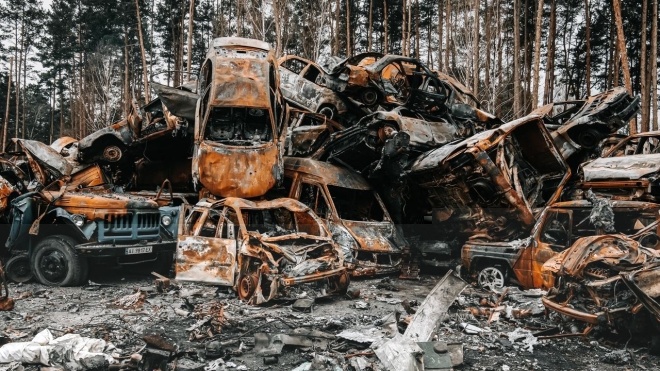On the night of April 19, the occupiers fired massively from multiple rocket launchers and artillery at the settlements of Kryvyi Rih Oblast: Zelenodolsk, Maryanska, Velyka Kostromka. In Luhansk and Donetsk Oblasts, the occupiers fired on 17 settlements, destroying six houses in Kreminna. As a result of the strikes, five civilians were killed and six others were injured, including a child. Residential areas of Kharkiv were shelled again, including Kyivkyi and Industrialny raions. Three people were killed and 16 were injured.
The first batch of a new package of US military aid has arrived at the border with Ukraine. It included: 18 units of 155-mm howitzers of the latest generation, 40 thousand artillery shells, 200 M113 armored personnel carriers, 11 Mi-17 helicopters, and 100 armored multi-purpose vehicles. NATO troops on the eastern flank will start training Ukrainian fighters to work with new howitzers in the coming days.
The Prime Minister of the Netherlands Mark Rutte talked with President Volodymyr Zelensky and announced arms supplies to Ukraine. The Netherlands will send heavy equipment to Ukraine, including armored vehicles.
Ukraine held its fifth prisoner exchange with Russia. 60 servicemen were exchanged, 10 of them officers. 16 civilians are also returning home. A total of 76 people returned to Ukraine.
Only 50% of the battalion tactical groups it had at the beginning of the war remained in Russia: 70-80 out of 120-130 BTGs. In addition, all units of the Russian Marine Corps suffered losses.
France does not need Russian gas and calls for sanctions against Russiaʼs energy sector. This was stated by French President Emmanuel Macron. New Zealand is imposing new sanctions on eighteen financial institutions in Russia, including Russiaʼs central bank, sovereign wealth fund, and the countryʼs largest financial institutions. These major institutions account for approximately 80% of Russiaʼs total banking assets.
McKinsey & Company, an international consulting company, stopped serving customers in Russia on April 15. Automaker Stellantis is suspending production at its Russian plant in Kaluga due to logistical difficulties and sanctions. In Russia, it produced and sold brands Peugeot, Citroën, Opel, Jeep, and Fiat. The German manufacturer of household chemicals Henkel AG will cease its activities in Russia, although on April 4 the company announced that it would not leave. The global cryptocurrency exchange Currency.com has announced that it is terminating operations and unilaterally terminating agreements with Russian citizens. All funds in the account will be transferred to the bank accounts from which the replenishment took place.
The Seimas of Lithuania has banned the public demonstration of St. Georgeʼs ribbon and other symbols of the Russian war against Ukraine — the letters Z, V, etc. Violation of this ban will result in a fine of € 300-700 for individuals and up to € 1.5 thousand for legal entities.
Austrian Chancellor Karl Negammer has ordered a fine of € 50,000 for anyone who distributes Russian propaganda media — Sputnik, RT and others.
The European Union plans to cover most of the Ukraineʼs post-war reconstruction funds. To do this, create a special fund, which is working on the European Commission. It will be an analogue of the fund to support EU member states during the pandemic.
